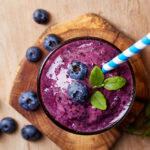Unexpected superfood can boost heart health and sharpen your mind
 (NaturalHealth365) When you hear “blueberries,” images of sun-dappled fields and grocery store shelves likely come to mind. Yet there’s a little appreciated superfood in the world of these beloved blue orbs: wild blueberries. These untamed cousins of the cultivated variety offer a unique twist on the familiar fruit.
(NaturalHealth365) When you hear “blueberries,” images of sun-dappled fields and grocery store shelves likely come to mind. Yet there’s a little appreciated superfood in the world of these beloved blue orbs: wild blueberries. These untamed cousins of the cultivated variety offer a unique twist on the familiar fruit.
Wild blueberries are nature’s compact powerhouses. Smaller than their cultivated counterparts, they pack a concentrated punch of flavor and nutrition. With less water content, their essence is distilled, resulting in a more intense taste experience. But the real magic lies beneath the surface – wild blueberries boast richer antioxidants and beneficial compounds, outshining their garden-grown relatives.
Recent research published in The American Journal of Clinical Nutrition has revealed these tiny fruits’ impressive impact on cognitive function and cardiovascular health. Let’s explore the intriguing discoveries made by these researchers.
Wild blueberries boost your body and mind
The wild blueberry study revealed some eye-opening results. Regarding brain power, people who regularly ate these berries showed noticeable improvements. Their memory sharpened, and they found it easier to stay focused. They also got better at tasks like planning and problem-solving – the kind of mental skills that help us navigate daily life. As a bonus, their minds seemed to work faster when tackling mental challenges.
On the heart health front, the news was equally encouraging. Those enjoying wild blueberries saw their blood pressure numbers drift down slightly – nothing drastic, but a step in the right direction. Their arteries also became more supple, which is great news for overall heart health. The researchers even noticed that the inner lining of blood vessels was functioning better, helping to keep the entire circulatory system running smoothly.
These findings paint an intriguing picture of wild blueberries as little powerhouses of health. It’s fascinating to think that adding a handful of these berries to our daily diet could have such far-reaching effects on our mental sharpness and heart health. Who knew such a small fruit could pack such a big punch?
The darker the wild blueberry, the sweeter the juice (and the benefits)
The benefits of wild blueberries are primarily derived from their deep blue pigmentation. The aforementioned anthocyanins create the rich blue hue. Anthocyanins are a type of polyphenol belonging to the flavonoid family, giving wild blueberries potent antioxidant properties. The daily amount of the wild blueberry powder used for the study had 302 milligrams of anthocyanins. In comparison, the placebo juice used for the study had zero anthocyanins.
Wild blueberries are not the only food that contains polyphenols. However, wild blueberries taste better than the other options (broccoli, turmeric, pears, purple veggies, etc.), especially when juiced.
The magic of wild blueberries’ polyphenols is not completely understood as of the date of this publication. However, food scientists and nutritionists believe polyphenols have metabolites that function as signaling molecules. Such molecules function through a variety of cellular signaling conduits. The current theory in academic circles is that wild blueberry polyphenol metabolites modulate the availability of enzymes and nitric oxide for health benefits.
How to incorporate this superfood into your diet
As noted in another study, a six-month wild blueberry intervention enhances mental processing speed. Wild is the keyword. Add 26 grams of wild blueberry powder to your smoothie or other drink, and you’ll enjoy the equivalent of 178 grams of whole blueberries. These totals equate to a whopping 75 blueberries per day.
In addition to smoothies, wild blueberries are an excellent addition to breakfast cereal or yogurt. Don’t forget, there’s always the option of downing wild blueberries by the handful. Of course, don’t overdo this food especially if you have blood sugar concerns. Otherwise, enjoy!
Sources for this article include:



